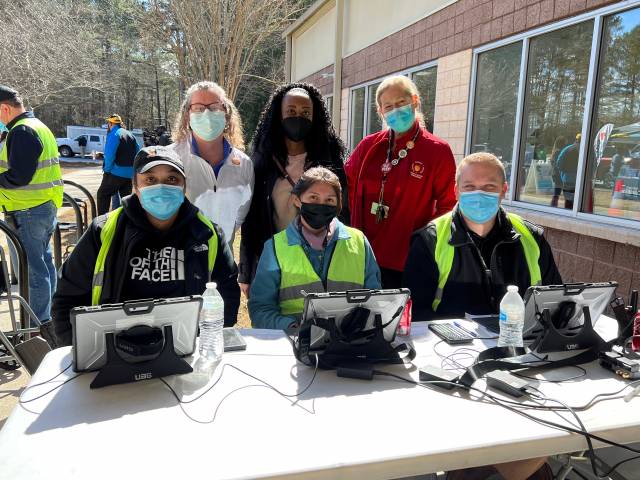You are here
Healthy, Vibrant and Vaxxed: Gwinnett Coalition Event Honors Black History Month
Gwinnett County, located just outside Atlanta, Georgia, is considered the most diverse county in the southeast, and according to U.S. Census Bureau, is one of the ten most diverse counties in the United States. I was pleased to be able to visit this unique community on February 26, 2022, and attend Healthy, Vibrant and Vaxxed, a walk-in COVID-19 vaccine clinic supported by the Gwinnett Coalition's program, Gwinnett Cares. The event, which honors Black History Month, was a fitting tribute to the 2022 theme of Black Health and Wellness, a critical issue for African Americans who continue to face disparities in health care that put them at significantly greater risk of getting sick and dying from COVID-19.
As of February 2022, 63 percent of all Gwinnett County residents had received at least one dose of the COVID-19 vaccine, but only 48 percent of Gwinnett’s Black residents had received one dose. With support from the CDC Foundation, the Black History Month clinic was part of ongoing outreach efforts by the Gwinnett Coalition to overcome vaccine hesitancy and increase COVID-19 vaccination rates in Gwinnett’s communities of color.
Healthy, Vibrant and Vaxxed took place in the Atlanta suburb of Snellville, and it was truly a community-wide endeavor. The Gwinnett Coalition organized the clinic with the help of the Gwinnett County Health Department, and local county commissioner Jasper Watkins III served as the key spokesperson.
“Vaccination rates among minority communities have fallen behind in this area of Gwinnett, and the county, with the support of several community partners, is working to ensure that all residents have every opportunity to protect themselves and their loved ones by getting a COVID-19 vaccine,” Watkins said. “The vaccines have proven extremely effective in preventing severe illness, hospitalization and death, and it’s time to roll up our sleeves so that no more Gwinnettians lose their lives to this virus.”
Community partners, including the Greater Eastside Chamber of Commerce, Gwinnett County NAACP and the Rho Kappa Lambda Chapter of Alpha Phi Alpha Fraternity, Inc., supported the event and collaborated to get the word out about the clinic through public service announcements, social media posts, press releases, public access television features, media ads and community calendar posts.
I was happy to see that the partners’ promotional efforts paid off with a huge turnout on that sunny Saturday morning. The atmosphere was friendly and welcoming, with the Gwinnett County Health Department director, Audrey Arona, MD, personally walking the lines most of the day to answer questions from community members waiting to be vaccinated.
“Through events like this we can move into the communities instead of asking the community to come to us. It’s good for those who may be on the fence,” Dr. Arona said. “Being around today and out and about talking to everybody, it’s amazing how many first doses we had today.”
Enthusiastic volunteers were also more than willing to talk about their own decisions to get vaccinated with people who were feeling hesitant.
“I chose to get vaccinated, not only to protect myself, but also to protect my community, my friends and my family,” said volunteer and local college student Emily Bull. “It’s important that we all get vaccinated so that future generations do not have to experience what we are experiencing.”
It was exciting to see just how much can be accomplished when local partners pool their enthusiasm, dedication and resources. By the end of the day, over 500 people were vaccinated during the clinic as friends and neighbors in Gwinnett County came together to protect their own health and the health of their community.
Funding for this effort is made possible through a subaward from the CDC Foundation and is part of the Centers for Disease Control and Prevention (CDC) of the U.S. Department of Health and Human Services (HHS) financial assistance award totaling $25,660,048 with 100 percent funding from CDC/HHS. The contents are those of the author(s) and do not necessarily represent the official views of, nor an endorsement by, CDC/HHS or the U.S. Government.
Photo credit: Nikka Sorrells/CDC Foundation

